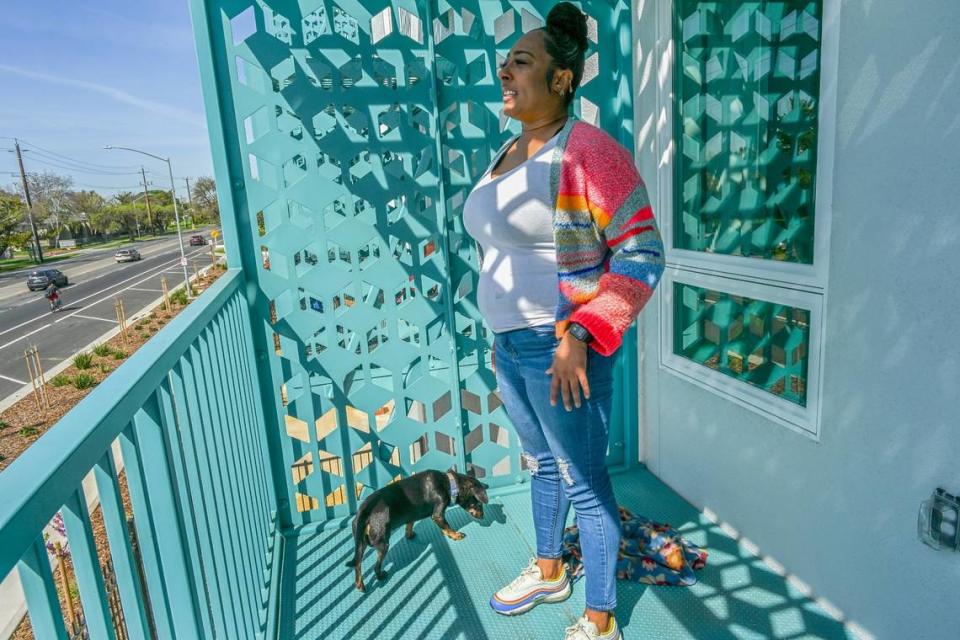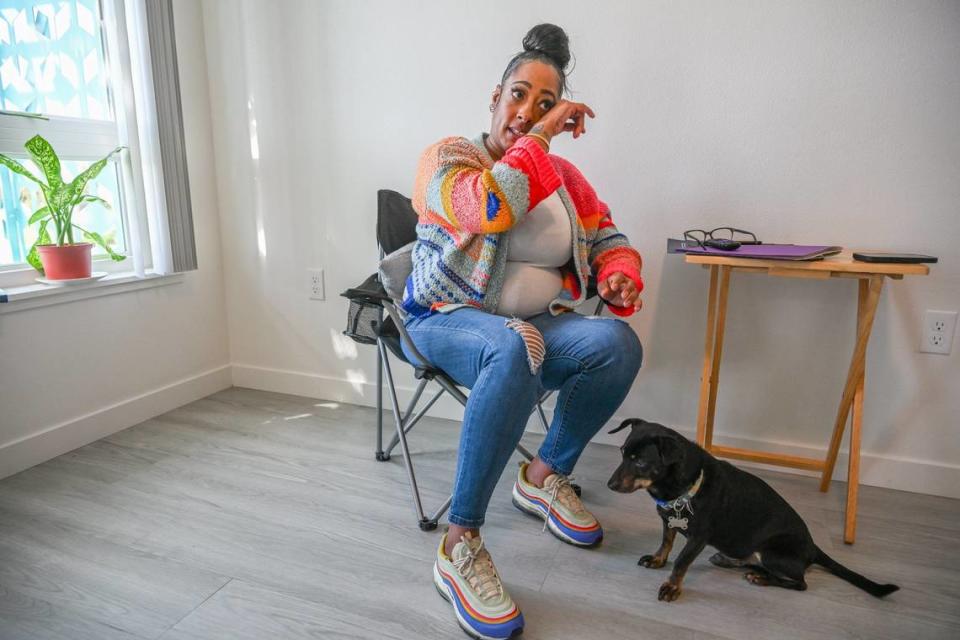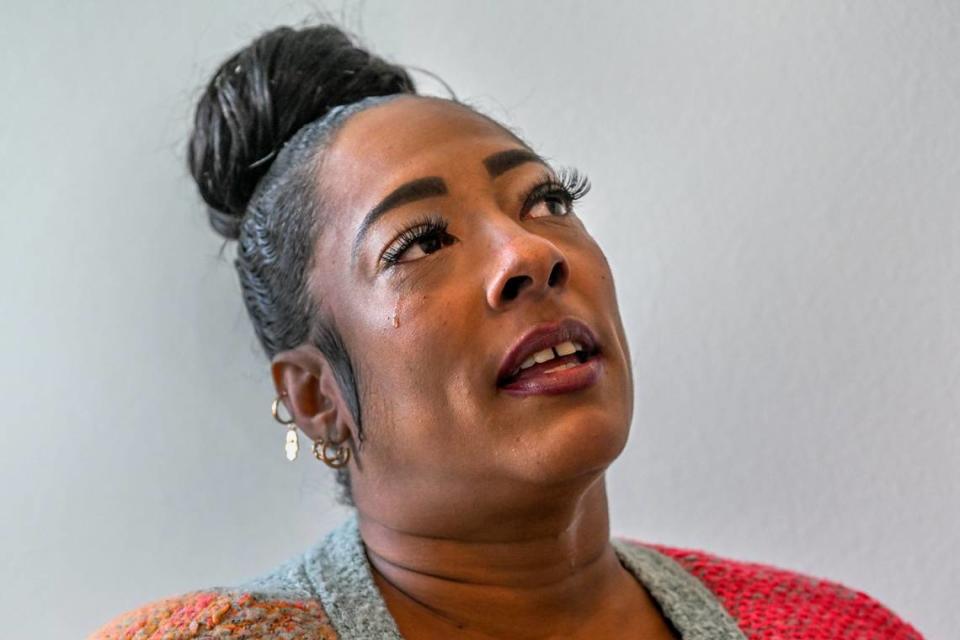How one Sacramento native slid into homelessness — and how she found a pathway out of it
In times of crisis, Shakela Wade’s godmother, Virginia Avila, had always swooped in and provided the stability and words of wisdom she needed to tackle life’s latest challenges.
So, in late 2022 when Wade learned that Avila was becoming forgetful and suffering falls, she quit her job doing shelter intake in San Francisco and returned to her native Sacramento to assist her.
That decision brought Wade, an African American woman in her 40s, to the lowest point of her life last summer, desperately scrabbling to earn enough money to cover the rent on her godmother’s Greenhaven apartment after Avila was admitted into a skilled-care facility in spring 2023.
All Wade’s efforts proved fruitless. Sheriff’s deputies showed up at her godmother’s door and gave her 10 minutes to collect her things and get out.
Despite her intimate knowledge of homelessness, Wade ended up living out of her car, struggling to silence her self-doubt.
“I was feeling weak,” she said. “I had low self-esteem, low self-worth. I was just feeling good-for-nothing.”
In 10 minutes on one day in July 2023, Wade’s life took the most unexpected of detours: She went from housed to homeless, from feeling secure to fearing for her safety, from confidently caring for someone else to questioning her own stability.
A striking number of California caregivers go through this upheaval, according to University of California research. Wade suddenly had to figure out how to shower, how she could get prepared food, how to edit her resume, how to apply for jobs without a computer, and where she would sleep.
She became skilled in making a sleeping pallet in the back seat. She found food and some creature comforts in a corridor of Sacramento between North 12th and North 16th streets, just north of the Alkali Flat and Mansion Flats neighborhoods.

Finding out where to shower, eat, hop on PC
There, the Loaves and Fishes charity, a decades-old advocate for unhoused people, offered a free breakfast at Maryhouse on North C Street and free lunches in the main dining room. Wade partook of both meals. She also used a library reading room there to update her resume and search for jobs.
She discovered that several organizations, including the Sacramento Pipeworks gym, had set up a system of free showers around the city and county.
She tried to remain upbeat but ended up using marijuana and alcohol to cope with depression that sometimes left her unable to leave the back seat of her car.
On one particularly tough day, she decided to call 211: “I spoke with a great person who gave me all the resources I could ever ask for,” Wade said. “I got connected with Sacramento County Mental Health Services and was wait-listed for shelter placement.”
In the last 12 months, 211 requests for help with housing or shelter far exceeded any other category, making up 30.4% of the 171,056 total requests received. Calls for help with mental health or addiction made up 4.8% of queries.
Three needs dominated the housing calls, requests for low-cost housing, 20,176; shelter, 18,408; or rent assistance, 9,308.
Last year, only 34% of demand for shelter beds was met, according to the annual report on the coordinated access system from Sacramento Steps Forward.
A few weeks after Wade’s call, a counselor met her at Loaves & Fishes to do an assessment. Sacramento County’s Homeless Engagement and Response Team often sees signs of post-traumatic stress and depression in unhoused residents, said HEART Supervisor Cait Fournier, and therapists continue to work with clients until they get word that a provider has opened a case for them.
Although Wade called 211 in August, it wasn’t until November that she finished assessments and enrollment. She then began working with clinicians at the behavioral health provider Telecare.
“I got a therapist and I got a psychiatrist,” she said.
Around the same time, she moved into a shelter: the Salvation Army’s Center of Hope on North B Street. It was catty-corner to her behavioral health provider’s office.

Shelter staff see trauma of homelessness in new arrivals
Major Rio Roy, the Sacramento County coordinator for the Salvation Army, said that he has witness incredible changes in clients who arrive looking shell-shocked and showing signs of mistrust.
“Most of the homeless people have gone through a lot of trauma, so we do lots of support and therapy around that,” Telecare’s regional director of operations, Kristine Suchan, said.
Telecare doesn’t require that clients give up drugs, Suchan said. Rather, they work to get clients to a point where they can make that choice. Roy said the Salvation Army Center of Hope takes a similar approach, but it does not allow clients to use drugs or alcohol on its premises.
“Our ultimate goal is to give people a slot to get off the street where they have hot showers, clean clothes, breakfast, lunch and dinner and a safe place to be,” he said.
There were temptations just steps away from the Center of Hope campus, however, Wade said.
“I didn’t want to be one of the people hanging out outside, kicking it and drinking,” she said. “We have business to take care of.”

Then Wade noticed that one of her bunkmates was “coming home every day, feeling excited, feeling wonderful, and Wade had to know why. She learned that the woman had been going to a job training and empowerment program at Women’s Empowerment.
Eventually, she and four bunkmates at the Center of Hope went to orientation for the nonprofit’s next session.
Lisa Culp, the founding executive director of Women’s Empowerment, said that, during orientation, as newcomers talk about how they learned of the program, most will say that they couldn’t believe the transformation they saw in someone who had gone through it.
“While they’re experiencing homelessness, these women feel very isolated,” Culp said. “They feel extremely judged, especially if they’re mothers, by people who don’t know their story.”
Over the course of the program, classes will cover letter writing, resume writing, mock interviews, job applications, Culp said, but the deeper work is showing them why they should believe in themselves.
Each class listens to folklore and other types of stories, Culp said. They write collective poems. They share events from their own lives. Each person arrives as a victim of past traumas, she said, but leaves as “a woman who can climb any mountain and ford any stream and do whatever it takes to reclaim her life and to reclaim what’s hers.”
She finds inspiration at Women’s Empowerment
From the first day of the nine-week program to the last, Wade said, she was excited to wake up and make her way to the job training program each morning. There, she said, a group of facilitators, all strangers to her, showed more faith in her resilience and ability to succeed in life than she had in herself.
While in the Women’s Empowerment training, Wade learned she had been placed in a one-bedroom apartment in a new affordable housing community developed by Sacramento-based Mutual Housing California. Located on Stockton Boulevard, Wade’s unit features a balcony, gleaming new appliances and interior space that would match spaces inside tony midtown buildings.

She pays 30% of any income she makes toward rent, and the Mutual Housing staff will assist her with transitioning to new housing as her life circumstances change.
Such affordable housing is in extremely high demand, though. Winter Chaslow, the vice president of property operations for Mutual Housing, said the nonprofit received 2,000 applications for the 167 units in the new Stockton Boulevard community. Sixty-seven of the units there were reserved for residents who had experienced homelessness.
Mutual Housing set a goal of adding 1,000 new affordable housing units by 2026, essentially doubling the size of the portfolio they had a couple years ago, said communications manager Steven Root, and the agency will open half those new units this year.
Mutual Housing also offers classes on financial literacy at many of its communities but will also have staff work one-on-one with residents who want to set and achieve financial goals. In the last four years, 41 Mutual Housing households have purchased single-family homes.
Her one dependable lifeline is cut
As Wade had struggled to find shelter last fall, her one dependable lifeline was cut: Avila died Sept. 12 at age 83.
A beloved educator at Del Paso elementary and junior high schools and at Grant High School, Avila was California Teacher of the Year in 2003. She spent much of her life extending her hand to people who had lost everything. She also worked for a time as an associate director at the Stanford Home for Children, and that was where she had met Wade’s mother and father.
When Wade’s parents split up, Wade, her mom and her brother briefly landed in a homeless shelter but then moved in with Avila until her mother got on her feet.
Looking around Avila’s apartment as she left, Wade took in all the keepsakes — photos, newspaper clippings and legislative commendations — that had “meant everything” to her Nani.
Caregivers are particularly susceptible to finding themselves homeless after the friend or relative they have supported goes into a nursing home or dies, UC researchers found as they did extensive field study for two reports on the causes and consequences of homelessness.
The findings made such an impression on Dr. Margot Kushel, a UC San Francisco physician who led the California Statewide Study of People Experiencing Homelessness, that she began asking her indigent, elderly patients whether they feared that, if they died or went into skilled care, their in-home caregivers would have no place to live. Kushel regularly refers patients to social workers to see if they can find ways to head off displacement.
“When you look at reasons for leaving housing, it’s often that somebody else became sick, disabled or died,” Kushel said.

